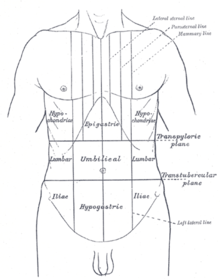User:Mr. Ibrahem/Indigestion
| Mr. Ibrahem/Indigestion | |
|---|---|
| Other names | Dyspepsia, upset stomach |
 | |
| Location of the upper abdomen, also known as the epigastrium | |
| Specialty | Gastroenterology |
| Symptoms | Upper abdominal discomfort, heartburn, reflux[1][2] |
| Causes | GERD, gastritis, peptic ulcer disease, esophageal spasm, delayed gastric emptying, lactose intolerance, coronary artery disease, cancer[3] |
| Diagnostic method | Resting for H. pylori, endoscopy[1] |
| Prevention | Avoiding smoking, alcohol, coffee, chocolate, fatty foods, and being overweight[2] |
| Treatment | Antacids, proton pump inhibitors, H2 receptor antagonists[2][4] |
| Frequency | Common[1] |
Indigestion, also known as dyspepsia or upset stomach, is the symptoms of upper abdominal discomfort, heartburn, or reflux.[2] It may also include abdominal fullness, nausea, belching, and feeling full earlier than expected when eating.[5][6] These symptoms are often long-term or recurrent.[6] It may decrease quality of life.[1]
Causes may include gastroesophageal reflux disease (GERD), gastritis, peptic ulcer disease, esophageal spasm, delayed gastric emptying, lactose intolerance, coronary artery disease, and cancer.[3] A number of medications may also causes problems including NSAIDs, bisphosphonates, and corticosteroids.[2] Functional indigestion may be diagnosed when there are symptoms but no evidence of underlying disease.[3]
In people over the age of 60 or with worrisome symptoms such as trouble swallowing, weight loss, or low red blood cells, endoscopy (a procedure where a camera on a flexible tube is inserted down the throat to the stomach) is recommended to assess potential causes.[1] In people under 60, testing for the bacteria H. pylori and if positive, treatment is recommended.[1] In Asia endoscopy is recommended in those over 35 years old.[1]
Measures that may help include avoiding smoking, alcohol, coffee, chocolate, fatty foods, and being overweight.[2] Not eating just before bed and raising the head of the bed may also help.[2] Often antacids help, while the addition of viscous lidocaine is of unclear benefit.[4] Proton pump inhibitors are often used, and H2 receptor antagonists may be added to this.[2]
Indigestion is common, affecting about 20% of people at some point during their life.[1] Functional indigestion makes up the majority of cases in Western countries, affecting about 15% of people.[7][8] Indigestion is not associated with a decrease in life expectancy. [1] The term is from the Greek "dys" meaning "bad" and "pepse" meaning "digestion".[5] Desciptions of the condition date from the 18th century.[5]
References[edit]
- ^ a b c d e f g h i Eusebi, Leonardo H; Black, Christopher J; Howden, Colin W; Ford, Alexander C (11 December 2019). "Effectiveness of management strategies for uninvestigated dyspepsia: systematic review and network meta-analysis". BMJ. 367: l6483. doi:10.1136/bmj.l6483. PMC 7190054. PMID 31826881.
- ^ a b c d e f g h "Recommendations | Gastro-oesophageal reflux disease and dyspepsia in adults: investigation and management | Guidance | NICE". www.nice.org.uk. 3 September 2014. Archived from the original on 21 May 2023. Retrieved 19 June 2023.
- ^ a b c "Dyspepsia - Gastrointestinal Disorders". Merck Manuals Professional Edition. Archived from the original on 23 March 2023. Retrieved 19 June 2023.
- ^ a b Ton, Joey (3 May 2021). "#289 Keeping it Simple for Emergency Room Dyspepsia". CFPCLearn. Archived from the original on 1 July 2023. Retrieved 15 June 2023.
- ^ a b c Schmidt-Martin, Daniel; Quigley, Eamonn M. M. (2011). "1. The definition of dyspepsia". In Duvnjak, Marko (ed.). Dyspepsia in clinical practice (1. Aufl. ed.). New York: Springer. p. 2. ISBN 9781441917300. Archived from the original on 2023-01-10. Retrieved 2022-03-28.
- ^ a b Talley NJ, Vakil N (October 2005). "Guidelines for the management of dyspepsia". Am. J. Gastroenterol. 100 (10): 2324–37. doi:10.1111/j.1572-0241.2005.00225.x. PMID 16181387. S2CID 16499689.
- ^ Saad RJ, Chey WD (August 2006). "Review article: current and emerging therapies for functional dyspepsia" (PDF). Aliment. Pharmacol. Ther. 24 (3): 475–92. doi:10.1111/j.1365-2036.2006.03005.x. hdl:2027.42/74835. PMID 16886913. Archived from the original on 2022-05-07. Retrieved 2022-03-28.
- ^ Ford, Alexander C.; Mahadeva, Sanjiv; Carbone, M. Florencia; Lacy, Brian E.; Talley, Nicholas J. (2020-11-21). "Functional dyspepsia". The Lancet. 396 (10263): 1689–1702. doi:10.1016/S0140-6736(20)30469-4. ISSN 0140-6736. PMID 33049222. S2CID 222254300. Archived from the original on 2022-05-07. Retrieved 2022-03-28.
